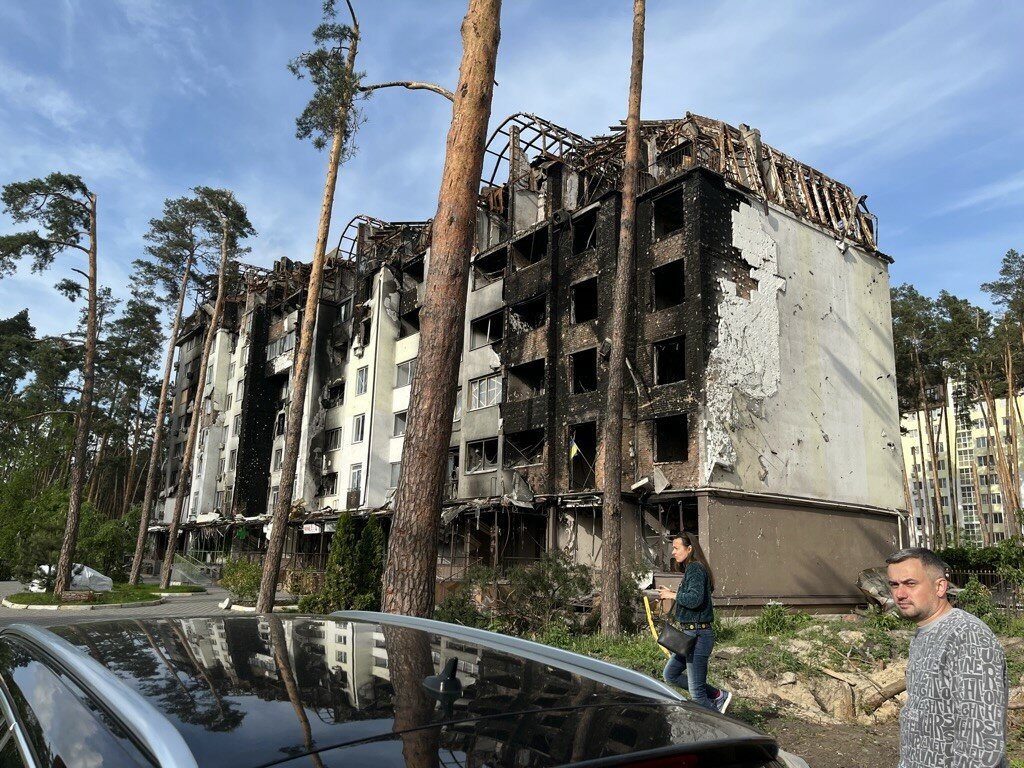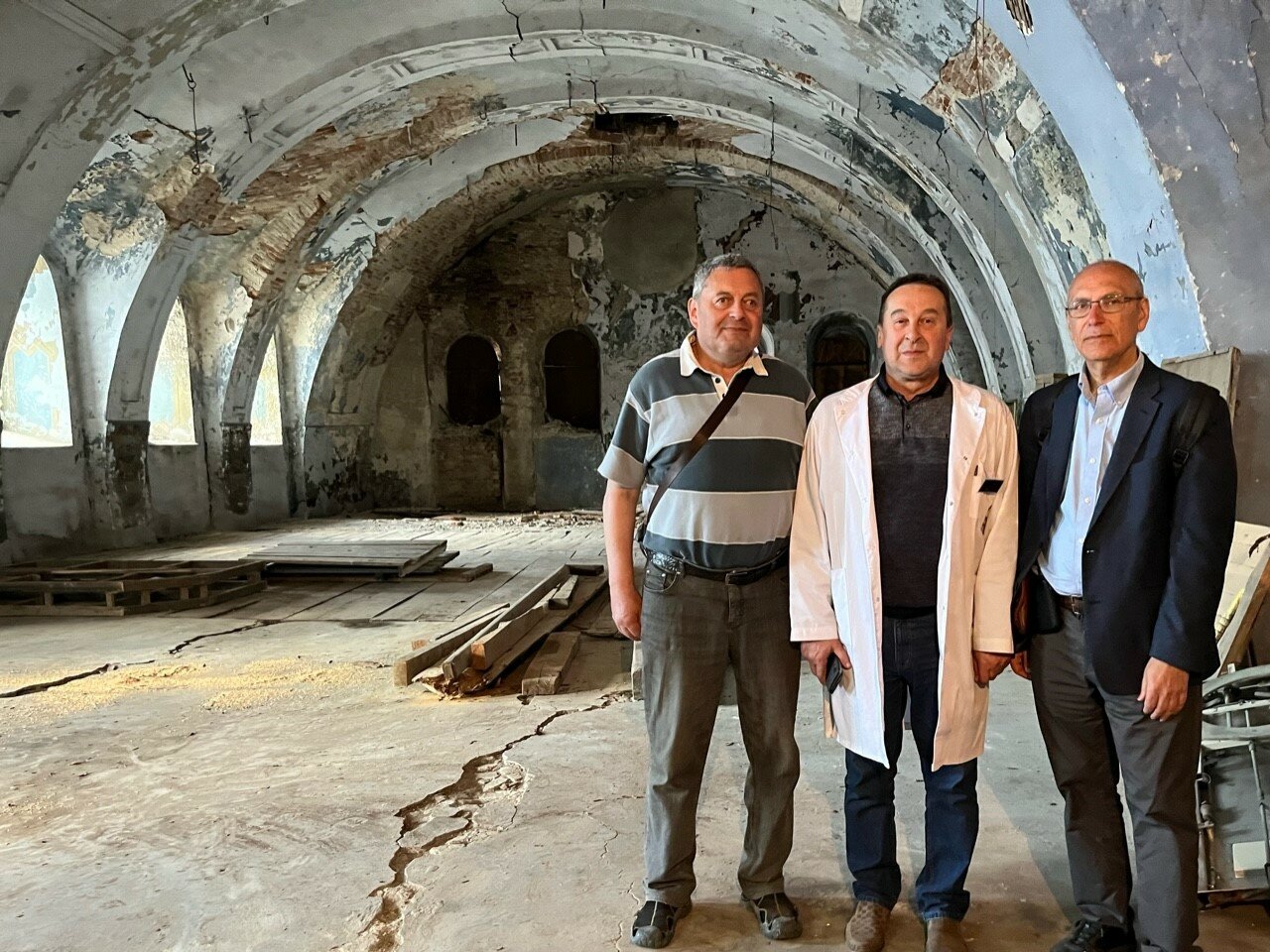‘We are different from Russians,’ Ukrainians told me
My life’s journey has enabled me to travel to eastern Europe, where my grandparents and father were born
From 2015 to 2019, I made annual trips to Ukraine, where I visited the birthplaces of my maternal grandparents, met with a rabbi and met two Jewish activists.
From 2017 to 2019, I traveled with Alan Kaul, of Sharon, Massachusetts. We visited his ancestral shetls, and met Jewish activists in Lviv and gentiles who were trying to save a Jewish cemetery and synagogue. In Lokhvytsia, we attended a moving Holocaust memorial ceremony and befriended a Jewish resident.
By the time the war started, I had 30 contacts in Ukraine.
In May 2022, I took the first of three trips to wartime Ukraine. Some highlights of my first wartime trip follow.
Kyiv and vicinity
There are no commercial flights to Ukraine. In May 2022, I flew to Budapest, Hungary, and took a 20-hour bus ride to Kyiv. Next to me sat Olga Maksimenko, who was visiting her husband for the first time since the war started. Olga spoke English and was happy to talk to a native English speaker. She said that, along with her parents, she took refuge in Slovenia at the start of the war. Convincing her parents to abruptly leave Kharkiv was a challenge.
“It wasn’t easy,” she said, “to act as my parents’ parents, rather than as their child.”
The bustling Kyiv that I had known was deserted. In normal times, you had to be very careful crossing the street – but not now.
Olga Maksimenko joined me on a short trip to Irpin and Bucha, nearby suburbs that were occupied by Russia for a month at the war’s start.
Our Uber driver told us, “I was in the Boryspil airport with my wife and children when the war broke out. We were on our way to a vacation in the Emirates. After two bombs struck the airport, we left our luggage and fled the glassed-in terminal.” He was already a refugee, having fled the area in Ukraine that Russia occupied in 2014 because he didn’t want to live in Russia.
Irpin resident Igor Vyshnevsky showed us around. We saw a pyramid of burnt cars, bombed-out neighborhoods and many 10-story apartment buildings that, if not destroyed, had all their windows blown out. Igor told me, “My entire life from now on will be before the war or after the war.”
Poltava Oblast
In Poltava, about three hours east of Kyiv, I had lunch at an outdoor restaurant with my friend Oleksandr Vorona and an American resident, Terrance McCracken. Terrance, who is not Jewish, had been in the choir at Temple Jeremiah, in Northfield, Illinois. I challenged him with some songs from the liturgy; he knew them better than I did.
When an air-raid alert sounded, neither Oleksandr nor Terrance reacted, saying that the warnings covered a wide area. Later, Svetlana Moskvitina, head of the JDC-supported Hesed Netesh, joined Oleksandr and me on a visit to the overgrown Poltava Jewish cemetery. A distant air-raid alert intruded.
In the city of Lokhvytsia, in Poltava Oblast, the birthplace of famed Soviet musician Isaak Dunayevsky, I greeted passersby, saying, “Hello, I’m visiting from America.” The first person walked quickly in the opposite direction. The second person replied in English, “I’m from Kharkiv, taking refuge in my hometown.”
I met the mayor, Viktor Radko, who was wearing a T-shirt. With Ukraine’s President Volodymyr Zelensky’s attire in mind, I teased Mayor Radko, “Are you running for president?” He quipped, “I can wear whatever I want on my day off.”
Pointing to a print on the wall, he said, “We don’t have pictures of politicians on the wall, but of writers.”
Much of the mayor’s time is spent caring for the many refugees in town, and regularly announcing the return of local soldiers who were killed in the war.
Western Ukraine
My friend and guide, Viktor Yedynak, offered me an apartment in Chortkiv, in Ternopil Oblast. Viktor introduced me to Yakov Baranov, head of the Jewish community, and Yakov’s wife, Maya.
Yakov took us inside an abandoned synagogue that was built around 1750. The unsafe building will probably be demolished.
I spent some time with Maya. Without a common language, what could we talk about? I pulled out my phone, and together we sang Joe Dassin songs – in French – from my music library.
Viktor took me to Tovste, near Skalat, on behalf of the Margolis family, of Newport. Locals showed us a field that was the Jewish cemetery. During the Soviet era, the matzevahs (gravestones) were removed to build a bathhouse. A few matzevah fragments that were returned to the cemetery lie scattered about.
A neighbor showed us an unmarked Holocaust site at the cemetery. “The polizei [German-appointed police],” he said, “did the shooting.”
An elderly man did not want to speak about World War II.
“The Russians were bad,” he said, “and the Germans were bad.”
But he did tell us that the town, which was in Poland before World War II, had both a Polish and a Ukrainian gymnasium. Jews could go to either one. He went to the Ukrainian school and remembered the names of some of the Jewish students. At the invitation of Jewish schoolmates, he and some friends went to Shabbat services.
In Skala-Podilska, we visited a large Jewish cemetery, mostly devoid of headstones, and saw buildings associated with the Jewish community. In a park, Viktor asked some workers for directions to an old tree. One of the workers, Volodymyr Plekan, was Jewish. He’d spotted my yarmulke. The tree was 537 years old! We took a photo, and Viktor suggested the caption: “Guess who is 50, 72 and 500 years old?”
When Ukrainians found out that I was American, there was an outpouring of friendliness, including many hugs in thanks for American aid.
“We are different from Russians,” Ukrainians told me. “They are used to living in a dictatorship. We are not. They are passive. We are not.”
I mentioned the thousands of people who were arrested in Russia for opposing the war. The countervailing evidence fell on deaf ears. They were optimistic about winning the war.
Postscript: My most recent visit to Ukraine was in May 2023. The date of my next visit is uncertain. I hope the war will be over, but Ukrainians will still have many years of suffering and misery in their future.
AARON GINSBURG lives in Stoughton, Massachusetts, and blogs at jewishnewport.blogspot.com.











